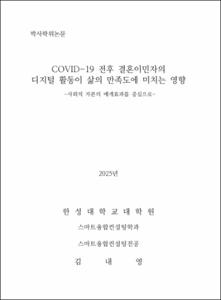COVID-19 전후 결혼이민자의 디지털 활동이 삶의 만족도에 미치는 영향
= Impact of digital activities on life satisfaction of marriage immigrants before and after COVID-19 : Focusing on the mediating effects of social capital
- Type
- Thesis
- Alternative Title
- 사회적 자본의 매개효과를 중심으로
- Advisor
- 정진택
- Department
- 대학원 스마트융합컨설팅학과
- Issued Date
- 2025
- Publisher
- 한성대학교 대학원
- Keyword
- 결혼이민자; 디지털 활동; 삶의 만족도; 사회적 자본; COVID-19 팬데믹
- Appears in Collections:
- 스마트융합컨설팅학과 > 1. Thesis
- Files in This Item:
-
-
Download
 200000862774.pdf
기타 데이터 / 1.67 MB / Adobe PDF
200000862774.pdf
기타 데이터 / 1.67 MB / Adobe PDF
-
Items in Repository are protected by copyright, with all rights reserved, unless otherwise indicated.